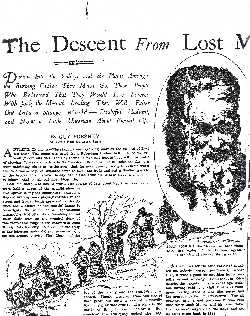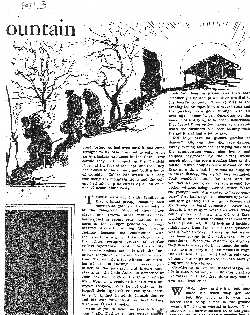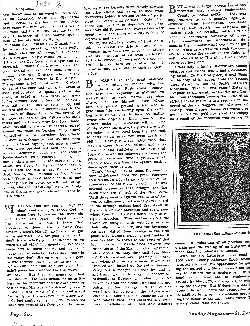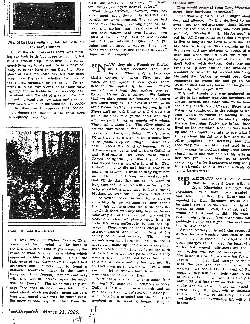The Descent From Lost Mountain
Down Into the Valleys and the Plains Amongst
the Rushing Cities They
Must Go, These People
Who Believed That They Would Live Forever.
With Joab, the Messiah, Leading They Will Falter
Out Into a Strange World --
Doubtful, Hesitant,
and Now a Little Uncertain About Eternal Life.
By GUY FORSHEY
St. Louis Post - Dispatch StaffA transcription of the rest of the
article is below the scanned images
|
click on the images below to view a larger image |
 |
 |
 |
 |
|
Sunday Magazine---St. louis Post-Dispatch ----March 21, 1926 |
ANTLERS, Oklahoma - The shadows
were growing short on the summit of Lost Mountain. The Mists had lifted
from Robertson Hollow half mile below, revealing here and there the tiny
forms of men and horses busy with the work of plowing. It was springtime in
southeastern Oklahoma. On all sides the farmers were exhibiting signs of
restlessness that farmers usually begin to exhibit when the first warm
days of sunshine come to swell the buds and put a livelier sparkle in
the brooks. Pushmataha County had arisen from its winter sleep and was
at it labors-- that is, all but Lost Mountain.
Lost mountain was not at work. The smoke of the late breakfast fires
rose lazily from half a dozen of the squalid shanties that sprawl along
the mountain's backbone. Ragged urchins were playing marbles in the
street and frowny heads appeared cautiously from the windows of the
meetin' house to investigate the sound of an approaching automobile. Not
often do automobiles thread their their way up the wooded slope of this
formidable ridge to the confines of Joab Morris' "eternal city." but
even if the chug of the laboring motor did arouse curiosity it did not
arouse activity. The "Church of the First Born" was at its worship and
would not be disturbed. From the dilapadated meetin' house at the head
of the village there came the monotone chant of a woman's voice and the
staccato tap tap tap of feet. A member of Joab Morris' quaint flock of
hermits was testifying.
"I thank God. I thank God. I thank God." The voice kept repeating,
half-hysterically. "I thank God for all things." It sounded like a Southern Negro campmeeting. . . . . "I thank God I've been borned again and reincrated.
I thank God I have passed the grave behind and can look back over my
shoulder and say, 'O grave, where is thy victim? O death, where is thy
sting?' " The speaker, a tall gaunt woman of about80, paced the floor
and swung her arms in wild gesticulation. A quaint picture she made, in
faded gingham dress and spectacles perched upon her forehead. The spirit
was talking and talking vehemently, and she was oblivious to her
surroundings, to the approach of dinner time, to the arrival of a motor
car and to the visitors who stole inside and took seats near the door.
Somewhat less obvious were her hearers ranged around the room on
benches. They stared inquisitively at the intruders, but offered no show
of welcome or hostility, and never once did those taping feet miss a
count. There were bearded old men and ageing women strapping young men
and comely bobbed-haired girls children holding babies in their arms and
other babies toddling about the floor. In his armchair throne, apart
from the others, sat the venerable Joab Morris, the "Messiah of Lost
Mountain." From a great shock of beard and bristling hair, he looked on
with solemn approval, and the "testifying" went on. Truly full
of thanks
and gratitude seemed that female orator.
"I THANK God for eternal life." the chant continued. "I thank God we
come here to live on this mountain and found His spirit. Great trouble
has come on us, but I know God wouldn't let them drive us away from here
if it wasn't His will, so I reckon we got to be satisfied. We air goin'
away and I don't know what's goin' to become of us when we git off o'
this mountain. We never come here to harm nobody and we hain't never
harmed nobody. Folks down there in the valley don't like us cause we air
goin' to live forever and they air all gonna die. but we can't hold that
agin 'em "cause they hain't never been teached the true work like we
have. But they air gonna git their punishment. The Lord meant for us to
live here on this mountain and they air gonna be visited with His wrath
for drivin' us away."
With a final burst of rhetoric and a call for hands on the question of
whether anybody had aught against her, the speaker sat down and yielded
the floor to another member of the colony and the testifying proceeded.
Thanks went up from the top of that great hill until it seemed outwardly
that only gratitude ever found a place in the minds of its primitive
inhabitants. But somehow the testifying lacked the ring [at least one
line of words missing] -low, as if the hermits were simply turning the
other cheek and trying to hide from themselves behind a routine babble
of scriptural and ceremonial phrases. Only when there was mention of
departure from the mountain did it seem that expressions were
spontaneous and these were expressions of dejection and alarm.
Truly the religious colony of Lost Mountain has reason for dejection and
alarm. Troubles have been few since Joab Morris and his followers
retired from civilization to the backwoods 12 years ago, but now real
trouble is upon them, for paradise---the only paradise that has a place
in their religion---is lost.
BY MARCH 25 they must abdicate Lost Mountain or reckon with the
authorities of Pushmataha County. And they are preparing to abdicate, to
scatter and to seek eternal life elsewhere, each for himself. Lost
Mountain, the sacred ground which was to give them life everlasting upon
the earth has been found, alas, to have an earthly owner who objects to
their presence. So, without belief in a hereafter, without hope of life
beyond the grave, they are faced with the calamity of removal from the
land that to them means protection from death and oblivion. Hardly is it
surprising then, that services these days are solemn and long-drawn-out
and testifying a bit hysterical. Joab Morris and his followers are facing
the great unknown ant time is growing short. Already they can hear the
spades beating down upon their graves.
Tragic though it is to them, the compulsory withdrawal from the great
pine-covered mountain ridge is an outgrowth of circumstances of their
own choosing. It was internal dissension that brought the law down upon
the Church of the First Born. Until three months ago the residents of
Antlers, 14 miles away, had scarcely even heard of the strange recluse
band that dwelt in the clouds of Lost Mountain and spent any where from
four to eight hours daily in religious devotion. They seldom visited the
towns or mingled with the outsiders because their religion forbade it,
and the townspeople never visited them because in the first place they
weren't welcome and besides it was to hard to travel to the crest of
that high ridge which stands aloof between two lesser ridges of the
Kiamichi chain of mountains. About the only time that Joab Morris' flock
received even passing comment was when, at intervals, a member would be
arrested and locked up for petty thievery. Eking out a meager existence
by hunting and trapping or working as day laborers occasionally at
Kosoma, a lumbering hamlet two miles from the mountain's base, the
colonists had few dealings with the outside world and few persons in the
outside world except the Sheriff and neighboring farmers who missed
goats and chickens and potatoes occasionally ever had any dealings with
them. As for the land they had squatted on, nobody cared particularly
about that. It wasn't good for anything but a hermit's retreat anyway.
Somebody in Ohio bought the mountain many years ago without having paid
it a visit first and then upon hearing what it was like, never had the
courage to visit it afterwards. For all ordinary intents and purposes it
was free land when Joab Morris and his tribe drove their covered wagons
up the slope and set up their camp back in 1914.
But it wasn't illegal occupation of the mountain that aroused Pushmataha
County to hostile action. That was only resorted to as a possible legal
instrument. The fundamental complaint was that Joab Morris' uncouth and
unwashed flock of hermits with flexible principles concerning ownership of
property, constituted an undesirable element in the community and ought
to be got rid of. Then as a straw to break the camel's back came the
recent church fight, locally referred to as "The night that Charley
Estes got beat up."
It was only a family disturbance among relatives and friends, but it had
a devastating effect. in the first place, it sent Estes to the hospital
to recover from the bruises administered by six of Joab's stalwart
henchmen. That, in turn, caused Estes to complain to the county
authorities and Lost Mountain thereupon became the scene of an official
investigation which resulted in the arrest of the six floggers on
charges of rioting. The charges themselves weren't so serious, but the
publicity given the colony as a result of the encounter was serious. It
caused a rehashing of all previous complaints and the voicing of an
insistent demand that the colonists be ousted.
With the six disturbers under bond [of] $500 each, County Attorney Louis
Gosse[?] detected a long-sought opportunity for gaining the desired end.
He summoned the leaders to Antlers for a conference. If the band would
clear out of Pushmataha County by March 25, and stay out, he would drop
the charges. But if departure was not prompt he would press the
prosecution and in addition bring up dispossession proceedings on behalf
of the mountain's owner. The colony could take its choice.
Under the circumstances there was nothing for Joab to do but agree to
get out, but it is a drastic step. Whatever may be his convictions as to
eternal life in a physical body, it is not hard to see that the "Messiah"
of Lost Mountain has but few more year upon the earth, whether he lives
on the sacred mountain or off of it. To express it in his own words he is
"nigh onto eighty." and so feeble he can scarcely hobble about with the
aid of a cane. For him to lead his band into new lands and start all
over again would be unthinkable. It couldn't be done, so it appears that
banishment dooms the Church of the First Born to a speedy dissolution.
It was from Kingfisher County, Oklahoma that the "prophet" led his band
to the Kiamichi Mountains 12 years ago sas the result of what he says
was a vision which appeared to him three times. "Go to the fastnesses of
the Kiamichis." the spirit had counseled him. "There will be found a
hallowed mountain which is the Lord's footstool. Live thereon, keeping
contracts with God, and life eternal upon the earth will be ours." The
vision was so plain says Joab that no doubt was left in his mind about
which particular mountain of a long and rugged chain was the sacred peak.
He knew it was Lost Mountain from the start, before he had even seen it
and came straight to its base prepared to enter upon an everlasting
existence in the flesh. For awhile they had camped on the Kiamichi
River, at the foot of the slope, and then they had moved to the summit
and built a house of worship. Cabins had arisen in a long row along the
mountain ridge and the colony had taken up its career as a unit on a
sort of communistic basis.
THERE were about eight families in that original group, including two
married daughters and a married son of the "Messiah" Most of these have
stayed and several other families have been added in recent years
through marriages of the younger generation. Long-bearded Joab remains
the supreme dictator because his communion with the spirit was a little
closer, and the others occupied grades of greater or less importance
according to their ability to receive visions and interpret the "unknown
tongues" which are likely to speak from that mountain top without any
warning at all. Jim Darling, bewhiskered son-in-law of th patriarch and
known hereabouts as "the little Jesus" in deference to Joab, has risen
high in the Church of the First Born as a result of his skill with
unknown tongues. Why he not only can interpret them right off, but can
speak them himself. In fact, he admits himself that he and his wife "are
about the best talkers that ever talked, I reckon."
"You ought to hear me preach for an hour," said Darling to the writer
shortly after the testifying was over. "I'd learn you things you never
learned before."
That demonstration, however, was not encouraged, even though its
instructional possibilities were admitted. The visitor had heard Mrs.
Darling preaching upon his arrival and having thus heard one of the two
best talkers that ever talke," was satisfied for one day, But he was
hoping one of those unknown tongues would get going and ventured to
express that hope. What were these strange tongues anyway? Some foreign
language?
"NAW, they ain't French or English or Dutch," declared the little Jesus.
"They ain't a language that's spoken on earth. They are the voice of the
spirit. I can speak them because the spirit is in me. That's one of the
things that makes our religion different from others. We believe that we
ain't gonna die because our bodies are God's temples. He lives in them,
so he ain't gonna destroy his own temples, is he? There ain't no such
thing as a God that sits up in the skies In a golden chair, and they
ain't no such things as angels with wings. That's all a damn lie. The
other churches believe that when a man dies he goes to heaven and keeps
on living. That's crazy. When they bury a man in the ground, how is he
gonna keep living? I don't care nothin' about that kind of heaven.
What if there was a heaven and all these Catholics and Protestants and
Jews went there. They'd be fightin' just like they do now and they'd
have a hell of a time of it. Naw, I don't want to die and take a chance
on going to heaven. I want to stay right here on earth and if I keep my
contact with God I'll do that. It's natural to want to live, ain't it? A
rabbit will run for its life. Why shouldn't a man want to live forever?
Methuselah lived for 900 years didn't he?"
The writer looked in vain for a sign of something in the existence of
these people that might make eternal life in the body desirable. If
there was anything besides the exhilarating air of that mountain top
and the marvelous view of pine-covered hills to make life even
sufferable, it was not apparent. There were no books except a few
tattered Bibles and few members of the colony could read anyway. The
children weren't even sent to school until the recent court case came
up. There were no shows within reach and Darling declared the flock of
Joab Morris wouldn't go to shows if they were available. Joab had never
been even to a picture show and neither had he. He couldn't even go to
town nowadays without seeing a lot of women half dressed and he was
ashamed to look at them.
Were there any amusements aside from hunting? No, none except religious
services Daily at 9:1 a. m. (nine o'clock and ten minutes as Darling
insisted upon having it) a hunting horn sounded and the colony assembled
in the meeting house. Prophet Joab led them in prayer and then each
member got up and preached or testified to his heart's content. Then at
7:15 in the evening the trumpet blew a second time and the services were
gone through with all over again, their length depending on the amount
of testifying to be done. Sometimes they lasted three or four hours at a
stretch when the members had been talking with the spirit and had a lot
to say.
Did they have no games, parties or dances? Oh, yes; they did have
dances. Every evening after the testifying was over the congregation
would sing hymns and couples designated by the elders would march about
the room keeping time to the music. Three couples were allowed on the
floor at a time, but there was no hugging in these dances, the visitor
was reminded. Joab wouldn't stand for that and he wouldn't let young
couples run around together without being married either. When the
younger members wanted t "keep company" they had to get the church's
approval and then go away to town, get a license and go through a legal
ceremony. After all, though, their religion wasn't so strict. They could
smoke and chew and drink if they wanted to and it was obvious that
swearing wasn't prohibited. It did look as if bathing might have been
taboo, but that question was allowed to pass. It may be that water has
been scarce in the settlement. It is sometimes. When the cisterns go dry
as they nearly always do in summer, the colonists have to carry it up
the mountain from the Kiamichi River. And that is only one of many
hardships involved in Joab Morris' program of life eternal.
Considering all of the disadvantages of life in such a retreat, why did
they want to live forever? Didn't they think they would ever get tired
of it?
WELL, they might not have much fun when they got old but life, such as
it was, was better than being buried in the ground wasn't it? Darling
wanted to know. Their transcendent horror seemed to be the grave and the
fall of clods upon a wooden box. It haunted him.
Then would removal from Lost Mountain mean their inevitable extenction?
That was a question that brought shudders and silence. Darling declined
to answer, but the octegenarian, Joab Morris hobbling about on his cane,
was more philosophical. "Maybe it will. Maybe not," he put in. "All I
can count on is that I'm going to live as long as the Lord is with me.
He has been with us on this mountain so far. We never had any sickness
to speak of up here and when we did have we cured it by prayer and
laying on of hands. We don't bother with doctors. Only one man ever died
up here and he died because he wouldn't do what Christ wanted him to do.
He said that before he would obey God's commands he would die and go to
hell. Well he died and was buried in the ground. That was hell, wasn't
it."
This unfortunate one who preferred hell to life in the colony was Abe
Barnhart, the visitor learned, and more was to be heard about his death
from Charley Estes when Estes was sought out in the village of Kosoma,
where he works at loading lumber. Estes who married Barnhart's widow
thereby becoming Joab's son-in-law, hasn't lived on the mountain since he
was beaten up and he doesn't hesitate to say what He thinks about his
father-in-law and all the other prophets. He declares resentfully that
they "laid for him" and tried to kill him because he wouldn't obey Joab
Morris' church rules and wouldn't let his wife and her two grown
daughters go to services every day. As for Barnhart's taking off, He
hints strongly that it wasn't entirely due to the Lord's wrath.
"BARNHART had a lot of money that he brought here with him from
Kingfisher County" Estes explained. "Old man Joab wanted it and told him
that the Lord had demanded it; that Barnhart would die if he didn't give
it to the church, or in other words, to Joab. Well Barnhart said he would
die first, and he did. He went to bed one night in good health and was
taken suddenly sick in the night. The next morning he was dead."
Around Antlers it is said the prosecution authorities are keeping this
case in mind with a view to possible investigation if the other charges
fail to oust the bearded lunatics; but present indications are that a
resurrection will not be necessary. Joab Morris and his band are
preparing for withdrawal. They have had enough of dealing with the law
and are loading up their wagons. To Atoka County, west of Pushmataha,
they will turn their steps in quest of jobs as farmhands, and it is
likely that March 25 will find them on their way. Their cabins and the
church house will stand deserted. Lost Mountain will be abandoned to the
wild things of the forest. Paradise and their hope of everlasting life
will be left behind.
Sunday Magazine---St. louis Post-Dispatch ----March 21, 1926
|





